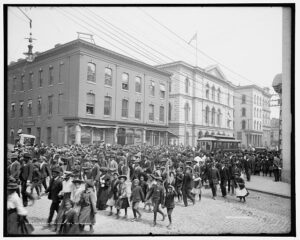
Emancipation Day, Richmond, Va. Retrieved from the Library of Congress, https://www.loc.gov/item/2016804723/.
Juneteenth, also known as Emancipation Day or Juneteenth Independence Day, is a holiday commemorating the end of slavery in the United States, observed annually on June 19. Juneteenth is observed this year on Saturday, June 19, 2021. Its origin lies in the story of emancipation itself, the end of slavery in this country. The abolishment of slavery came to different places in different ways, mainly through the action taken by the enslaved themselves, who understood from the beginning of the Civil War that the conflict had to do with the existence of slavery in the southern states, and its extension into the new American territories in the west. Many of those who were enslaved took matters into their own hands and simply freed themselves—they walked away from plantations and farms, or they followed the United States Army when it arrived in force. Emancipation as a matter of military policy became official with President Lincoln’s Emancipation Proclamation, effective January 1, 1863. It freed those held in slavery in the states that were in rebellion against the authority of the United States, and as such, it couldn’t be enforced until the appearance of the United States Army in those states, like Georgia. Legend has it that those enslaved in Texas did not hear about emancipation—and hence their freedom—until the arrival of US General Gordon Granger on June 19, 1865, proclaiming the end of slavery in Texas. Their celebration when they heard the news was symbolic of the jubilation felt by all those who had formerly been enslaved.
The following year, on June 19, the first official Juneteenth celebrations took place in Texas. The original observances included prayer meetings and the singing of spirituals, and celebrants wore new clothes as a way of representing their newfound freedom. Within a few years, African Americans in other states were celebrating the day as well, making it an annual tradition. Celebrations have continued across the United States into the 21st century. Juneteenth became a state holiday in Texas in 1980, and a number of other states subsequently followed suit. The day is also celebrated outside the United States, with organizations in a number of countries using the day to recognize the end of slavery.
